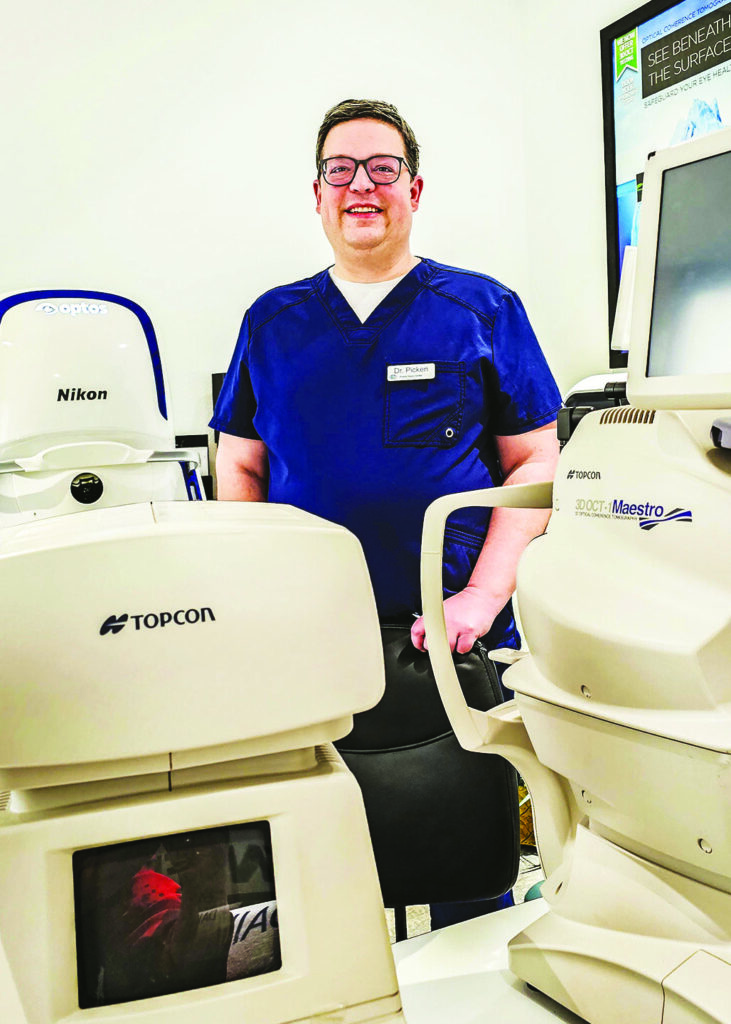
Dr. Jace Picken of Prairie Vision Center says there’s no such thing as truly perfect vision: “Everyone has strengths and weaknesses.” (Photo/Nancy Hanson.)
Nancy Edmonds Hanson
There’s more to vision care than many people see.
“You hear people talking about ‘perfect vision,’ but there’s no such thing,” Dr. Jace Picken observes. “Everyone has strengths and weaknesses. Our goal is to maximize strengths and minimize the weaknesses.”
Picken’s optometric clinic itself is easier to spot today than in the first five years he has practiced in Moorhead. Earlier this year, Prairie Vision Center moved just three blocks south from American Square on Center Avenue to 202 Eighth St. S., just north of McDonald’s.
There he offers the full range of optometric services – vision exams, of course, as well the additional kinds of screening and treatment that can help maintain eyesight for a lifetime. Starting with children, he looks for the kinds of conditions that affect the ability to see well, from nearsightedness and farsightedness to medical issues and how well the child’s eyes work together.
The answer might be glasses. An eye-opening study by the American Optometric Association has found that 25% of children already wear or need glasses to aid their vision by the time they start kindergarten. But lenses may not be the whole answer. “For some children, glasses don’t completely solve the problem. For them, vision therapy may be the answer,” he suggests. The therapy, for which he makes referrals, helps the eyes work in coordination and focus adequately.
“The schools are generally doing a very good job of finding children who need care,” he comments. “But we do recommend a full eye examination at the time the child enters kindergarten. It’s important to check at the time when the demand on their vision goes up dramatically. Reading is a unique visual skill.”
As his patients mature, the range of possible vision issues multiplies. Comprehensive exams can identify the onset of glaucoma, retinopathy, macular degeneration, cataracts, chronic dry eye and other issues. He is equipped to treat many, but refers those needing surgical intervention to ophthalmologists. (The difference: Optometrists are experts in detecting vision issues and other ocular problems, but refer patients to the medically trained opthalmologists for invasive forms of care.)
He also is available to care for those with pinkeye and eye emergencies, such as removing a foreign object that has gotten lodged in the eye. “We’re uniquely qualified for treating diseases of the eye,” he says.
Picken suggests annual exams for people of all ages. “Ours is a youthful practice. We’ve been here in Moorhead since 2017,” he says. “With so many college students in the area, we tend to see younger adults and families with kids. But we offer a comprehensive eye-care practice, with patients from 2 to almost 100.”
Engineering originally drew the Dickinson, North Dakota, native’s interest before he spotted the profession of optometry. “I’ve always liked math and science,” he explains. “But I also wanted to work with people and make a difference in their lives. Optometry provides a nice blend of technological skill with caring for people throughout their lifetimes.”
After starting out at Dickinson State University, he went on to Pacific University College of Optometry near Portland, Oregon. He also completed two preceptorships, one with the Navajo Nation at Kayenta, Arizona, the other at Minot Air Force Base.
After graduation, Picken worked in commercial optometry before joining Dr. William Welder’s clinic in Wahpeton in 2011. They established their Moorhead location in 2017; Welder continues as his silent partner.
“This profession has seen massive changes since the turn of the century,” he observes. “Laser imaging has blossomed. The old practices of dilating pupils and using manual lenses to diagnose vision have given way to far more advanced approaches. I expect AI (artificial intelligence) will do even more. We’ll be getting better machines capable of even better diagnostics.”
One of those advances has eased the most basic everyday practice: booking appointments. Patients can now choose the day and time that are most convenient at Prairie Vision Center’s online portal, www.prairievision.net/contact-us/book-appointment. Clinic hours are from 9 a.m. to 6:30 p.m. Mondays; from 8:30 to 5:30 Tuesdays through Thursdays; and from 8:30 to 1:30 p.m. Fridays.


